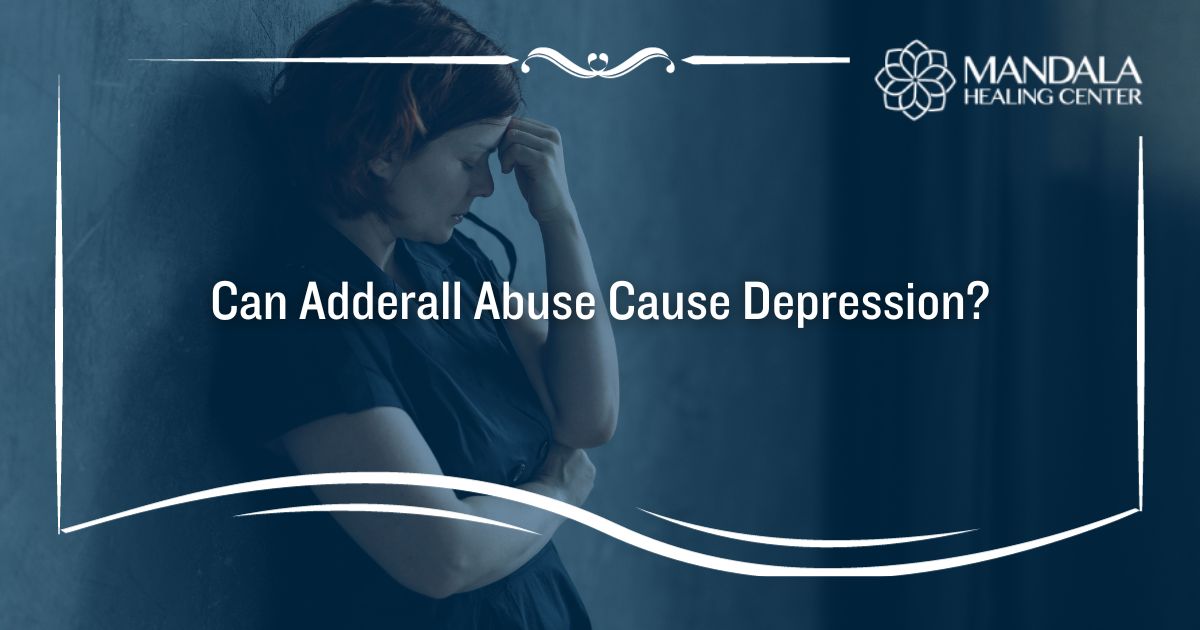Millions of people take prescription drugs each year, and each has its own risks and potential side effects. Some drugs, including Adderall, have a risk for abuse and addiction. Misusing Adderall can raise the risk of complications and unintended side effects.
Research has shown a link between Adderall abuse and depression. If you or someone you love misuses Adderall, understanding this connection is critical so that you can make informed decisions about your substance use and medical care.
Adderall abuse is a serious, complex issue that requires comprehensive care and ongoing support. Reach out to the team at the Mandala Healing Center now to learn more about Adderall addiction treatment or to explore other forms of support during addiction recovery.
What is Adderall?
Adderall is a prescription drug used primarily during treatment for attention disorders like ADHD and narcolepsy. It contains a combination of dextroamphetamine and amphetamine. Adderall’s stimulant effects can alter chemicals in the brain and nerves related to impulse control and hyperactivity. People who take Adderall to manage an attention deficit disorder experience reduced symptoms of this condition.
People who take Adderall recreationally (without a prescription) may experience increased wakefulness and energy, as well as an increased ability to sustain focus and attention. College students and teens may take Adderall for its stimulant effects, allowing them to study for longer periods or delay the need for sleep.
The Link Between Adderall and Depression
There are multiple links between Adderall and depression. Some people take Adderall to manage depressive symptoms, and some people develop depression after taking it. If you take Adderall and experience depression, you must work with a medical or mental health professional to pinpoint the cause of your depressive symptoms, and you may need to stop using Adderall.
Using Adderall during treatment for depression
Some doctors may prescribe Adderall for patients with depression in combination with ADHD. Adderall is not an antidepressant medication, but it does increase alertness, energy, and attention, which can be low in people with depression.
Typically, if a doctor prescribes Adderall for depression, the patient will take a much lower dose than that used to treat ADHD or narcolepsy.
Some medical providers believe it is best to diagnose and treat ADHD and depression separately. Mental health practitioners often prefer to identify and treat depression first before addressing attention disorders and other cognitive conditions.
People with depression require comprehensive care and ongoing support so that they can manage the symptoms of this condition and function in daily life. Comprehensive depression treatment often includes:
- Medications
- Cognitive-behavioral therapies
- Lifestyle changes
- Group therapy
- Family therapy
- Holistic support like nutrition therapy, art and music therapy, and mindfulness
Adderall is not an approved depression treatment. People should never take Adderall without a prescription and must consult their doctor if they take it recreationally for any reason.
Developing depression after taking Adderall
Adderall use may also lead to developing depression. This is especially true for people taking high doses of Adderall who abruptly stop using it.
Recreational use is more likely to lead to complications, including abuse and addiction. People who suddenly stop taking Adderall after a long period of heavy use are likely to experience withdrawal symptoms, which may include:
- Depression
- Fatigue
- Insomnia
- Suicidal thoughts
If you or someone you love takes Adderall recreationally, you must seek treatment, beginning with a medically-supported detox program. The support of a supervised Adderall detox program can ensure you have the support you need to stay safe during withdrawal and that you can have a complete detox.
Signs of Adderall Abuse and Addiction
Recognizing Adderall abuse is the first step toward getting the help you need to recover from it. Adderall abuse often causes noticeable changes in how a person thinks, feels, looks, and behaves. Some of the signs of Adderall abuse include:
- Excessive talkativeness and racing thoughts
- Grandiosity, a sense of invincibility, or extreme excitement and well-being
- Dry mouth
- Nausea and vomiting
- Anxiety, nervousness, tension, and panic
- Having several prescriptions for Adderall from multiple doctors
- Using Adderall differently than prescribed–taking larger or more frequent doses or ingesting it differently, such as crushing and snorting it
- Becoming anxious if you don’t have Adderall or you’re running low
- Using a lot of time, energy, and resources to get, use, and recover from using Adderall
People who become addicted to Adderall may experience significant changes in behaviors, such as:
- Taking risks while using Adderall, such as driving under the influence
- Neglecting responsibilities, relationships, and interests
- Needing to use more Adderall to feel the desired effects
- Experiencing withdrawal symptoms, such as depression, if they stop using Adderall
Living with Adderall abuse can lead to severe complications, including depression and addiction. People who misuse Adderall must seek treatment to safely stop taking it and learn how to avoid relapse for the rest of their lives.
Find Treatment for Depression and Adderall Abuse
If you or someone you love needs treatment for Adderall abuse and depression, you are not alone. Comprehensive treatment for depression and substance abuse is available at the Mandala Healing Center. Call our specialists today to learn more about how holistic substance use disorder treatment can help you regain control over your health and future.












